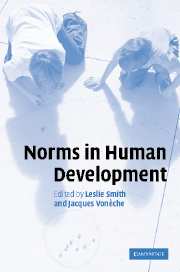Book contents
- Frontmatter
- Contents
- List of figures
- List of tables
- List of contributors
- Acknowledgments
- 1 Norms in human development: introduction
- Part I Norms and development in epistemology
- 2 The implicit normativity of developmental psychology
- 3 Developmental normativity and normative development
- 4 Genetic epistemology: naturalistic epistemology vs normative epistemology
- 5 Norms and normative facts in human development
- Part II Norms in moral and social development
- Part III Norms in cognitive development
- References
- Index
3 - Developmental normativity and normative development
Published online by Cambridge University Press: 22 September 2009
- Frontmatter
- Contents
- List of figures
- List of tables
- List of contributors
- Acknowledgments
- 1 Norms in human development: introduction
- Part I Norms and development in epistemology
- 2 The implicit normativity of developmental psychology
- 3 Developmental normativity and normative development
- 4 Genetic epistemology: naturalistic epistemology vs normative epistemology
- 5 Norms and normative facts in human development
- Part II Norms in moral and social development
- Part III Norms in cognitive development
- References
- Index
Summary
Development is guided by multiple norms, and further normativities emerge in development. This should be a commonplace observation – after all, it characterizes the core dialectic of developmental processes – but normativity is instead a perplexing and sometimes desperately ignored aspect of development. I will address some reasons why normativity is so perplexing, reasons that begin with Parmenides, and, therefore, that have a rather long history. Within the framework of that historical and conceptual diagnosis of the problem, I explore a model of the emergence of normativity. Finally, I will illustrate with several examples of emergent normativity in learning and development.
These emergent normativities include the normativity of truth and falsity that constitute representation and the – so I argue – related instrumental normativity of motivation, that of success and failure that guide learning, and the positivity and negativity of emotions. Within that outlined framework, I show how higher level motivations, such as curiosity, aesthetic motivation and competence motivation, emerge.
Studies of the mind and person – including psychology, including especially developmental psychology – suffer from a problematic conceptual framework that stems from the pre-Socratics, has dominated Western thought since that time and that makes fundamental theoretical understanding, especially regarding the mind and persons, impossible. I will outline this problematic framework, and show how it renders the normativity of mind and development naturalistically inscrutable. I begin with Parmenides.
- Type
- Chapter
- Information
- Norms in Human Development , pp. 57 - 76Publisher: Cambridge University PressPrint publication year: 2006
- 17
- Cited by



